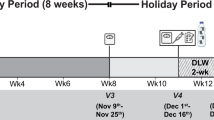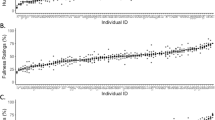Abstract
Objective: To examine the effect of increasing the variety of sensorially distinct but nutritionally identical foods on appetite, food intake and body weight, over 7 days, in men.
Design: Six younger, lean men (mean (s.d.) age 27.0 (2.9) y; weight 74.7 (3.9) kg; height 1.78 (0.03) m; body mass index (BMI) 23.6 (1.1) kg/m2) and six older, overweight men (mean (s.d.) age 39.7 (2.9) y; weight 89.2 (4.4) kg; height 1.78 (0.04) m; BMI 28.1 (0.5) kg/m2) were each studied three times during a 9 day protocol, whilst resident in the Human Nutrition Unit. On days 1–2, subjects consumed a medium fat (MF) maintenance diet (40% fat, 13% protein and 47% carbohydrate by energy) calculated at 1.6× resting metabolic rate (RMR). On days 3–9 subjects had ad libitum access to MF foods (550 kJ/100 g) with every item the same macronutrient composition and energy density. Subjects had continuous ad libitum access to 5, 10 or 15 food items per day on the low-variety (LV), medium-variety (MV) and high-variety (HV) treatments, respectively. The order of treatments was randomized across subjects. Subjective hunger was tracked hourly during waking hours using visual analogue scales (VAS). Body weight (as a proxy of changes in energy balance) was measured before eating and after voiding, each morning.
Results: Food and energy intake of the 12 men increased as the variety of foods increased, giving mean energy intakes of 10.13, 11.00 and 11.89 MJ/day on the LV, MV and HV treatments, respectively (F(2,20)=10.32; P<0.001). This effect was ascribable almost entirely to the lean men. Energy intake amounted to 1.57, 1.76 and 1.97×RMR in the lean men and 1.33, 1.40 and 1.45×RMR, for the overweight men on the LV, MV and HV diets, respectively. Weight changes amounted to −0.16, −0.28 and +0.43 kg (lean) −1.03 and −1.52 kg and −0.66 kg (overweight), on the LV, MV and HV diets, respectively. The overweight men may have constrained their energy intake relative to expected requirements. This may have been due to a congnitive effect or an age effect. There was no significant group or diet effect on subjectively rated hunger.
Conclusions: These data suggest that increasing the variety of sensorially distinct foods that are virtually identical in composition can increase food and energy intake and in the short to medium term can alter energy balance.
Sponsorship: This work was supported by the Scottish Office.
European Journal of Clinical Nutrition (2001) 55, 19–28
This is a preview of subscription content, access via your institution
Access options
Subscribe to this journal
Receive 12 print issues and online access
$259.00 per year
only $21.58 per issue
Buy this article
- Purchase on Springer Link
- Instant access to full article PDF
Prices may be subject to local taxes which are calculated during checkout
Similar content being viewed by others
Author information
Authors and Affiliations
Contributions
Guarantor: RJ Stubbs.
Contributors: RJS designed the study, organised the project and drafted the manuscript. AMJ, NM and SEM were responsible for data collection and collation. SF was responsible for statistical analysis.
RJ Stubbs: Member of the Aberdeen Centre for Energy Regulation and Obesity.
Corresponding author
Rights and permissions
About this article
Cite this article
Stubbs, R., Johnstone, A., Mazlan, N. et al. Effect of altering the variety of sensorially distinct foods, of the same macronutrient content, on food intake and body weight in men. Eur J Clin Nutr 55, 19–28 (2001). https://doi.org/10.1038/sj.ejcn.1601117
Received:
Revised:
Accepted:
Published:
Issue Date:
DOI: https://doi.org/10.1038/sj.ejcn.1601117
Keywords
This article is cited by
-
Contribution of energy density and food quantity to short-term fluctuations of energy intake in normal weight and obese subjects
European Journal of Nutrition (2010)
-
The Effect of Large Portion Sizes on Energy Intake Is Sustained for 11 Days
Obesity (2007)
-
Effect of sensory perception of foods on appetite and food intake: a review of studies on humans
International Journal of Obesity (2003)
-
Effects of test-meal palatability on compensatory eating following disguised fat and carbohydrate preloads
International Journal of Obesity (2001)



